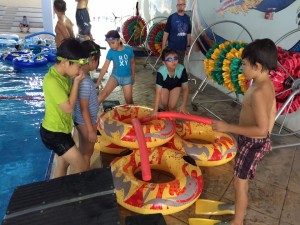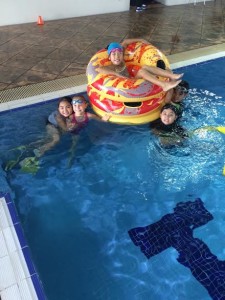Fifty years ago, US President John F Kennedy launched an initiative in American schools that would affect physical education for decades to come. The Cold War was in full effect and any given week could potentially see the outbreak of war with the Soviets. American teenagers needed to be physically ready to jump into the fray, and protect the American way of life. “If you are strong and fit, so will be the future of your country” read the propaganda of the time. It was in this atmosphere that Kennedy introduced the Fit as a Fiddle program to increase the physical fitness levels of American kids.
A school in southern California–La Sierra High School–served as the model school for Fit as a Fiddle. Promotional videos were filmed there to show America what was possible under the Kennedy model. The students looked like Olympic gymnasts, and would have put any Army basic training class to shame! Check out this video:
https://www.youtube.com/watch?v=fISgKl8dB3M&spfreload=10
Impressive, right? There was a big problem though–not everybody is an Olympic gymnast. Physicality occurs on a bell curve, and while everybody can improve their skills and become more fit, very few can achieve the fitness levels seen in this video. As well-meaning as Kennedy was, Fit as a Fiddle and programs like it began a polarization of physical education in America that would last three decades, through the 80’s. It became the Jocks–who had the fitness and could do the skills–against the Nerds, who hadn’t and couldn’t. PE teachers of the era were generally sport coaches who catered to their athletes at the expense of everybody else. Just ask any American from this era about their PE classes growing up; they’ll either say they loved it, or they hated it. Far too many will tell you that they hated it.
I’m happy to report that Physical Education is now in almost full recovery–with the students if not with all the parents. Modern PE teachers, while still often serving as sport coaches, recognize the difference between physical education and sport. The improvement of every student is prioritized–not just the high achievers–and the development of a positive attitude toward physical activity leading to lifelong fitness is an overriding goal of teachers today.
Among modern “best practices” in PE is the use of cooperative games to encourage interaction, communication, and inclusion in the students. SSIS second and third graders recently practiced one of these games in their swimming unit, an activity we called “Castaway”. The assignment was this: Build an island using the provided materials (4 tubes, 5 noodles). Each group would select a Castaway, who’s job was to jump from one of the diving platforms onto the island without going through into the water. The teammates were allowed to be around the island holding it together, but not to be underneath or inside the tubes. More general instructions (for all cooperative games) were to 1) listen to the ideas of your team 2) if you have an idea, share it 3) work together to get the job done! Some of the groups accomplished the task, some struggled, everybody had fun, and everybody learned.
In contrast, a Kennedy-era swimming class would have consisted of a small amount of stroke instruction, a lot of laps, and maybe some races on Friday, with winning over-emphasized. Sound like fun? The kids on the swim team would think so! The rest of us “aquatic learners” would probably rather be at the dentist, and that negative association would tend to keep us away from the pool and swimming later in life.
Physical education is in a pretty good place right now–we’re not alienating anybody like we once did, the kids are active and learning, almost all the elementary school students will list PE with their favorite things about school, as it should be! Parents, if you had a bad experience with PE growing up, if you had a PE teacher that favored the athletes and ignored you, if you had a fat PE teacher that sat in a chair blowing a whistle at you and hollering instructions to pick up the pace, please accept my sincere apology on behalf of the profession. Please believe that things are different now! And don’t be too hard on ol’ JFK; his heart was in the right place.
Written by Coach Mark Harris, SSIS Physical Education


![[AS] Welcome New Faculty, 2023-2024 (May 2023) Head of School Letter header](https://enews.ssis.edu.vn/wp-content/uploads/2022/08/HOS-Letter-SY22-23-218x150.png)

![[AS] Award-Winning Author Minh Lê Visits SSIS!](https://enews.ssis.edu.vn/wp-content/uploads/2023/04/Minh-Le-218x150.jpg)
![[AS] Annual Community Survey](https://enews.ssis.edu.vn/wp-content/uploads/2022/03/2022-Community-Survey-218x150.jpg)
![[ES] Classroom Placement, 2023-2024 – Opportunity for Parent Input elementary school general graphic](https://enews.ssis.edu.vn/wp-content/uploads/2022/07/ES-eNews-Cover-218x150.png)

![[G6-8] Important End-of-Year Events and Dates](https://enews.ssis.edu.vn/wp-content/uploads/2022/07/MS-eNews-Cover-218x150.png)


![[G9-11] Invitation to University Application Policies and Procedures, Wednesday, 8:00 am](https://enews.ssis.edu.vn/wp-content/uploads/2020/10/University-Application-Process-218x150.jpg)
![[G12] US Student Visa: US Consulate to Provide Information, Monday, May 8, 6:00 – 7:30 pm HS eNews Cover](https://enews.ssis.edu.vn/wp-content/uploads/2022/07/HS-eNews-Cover-218x150.png)





